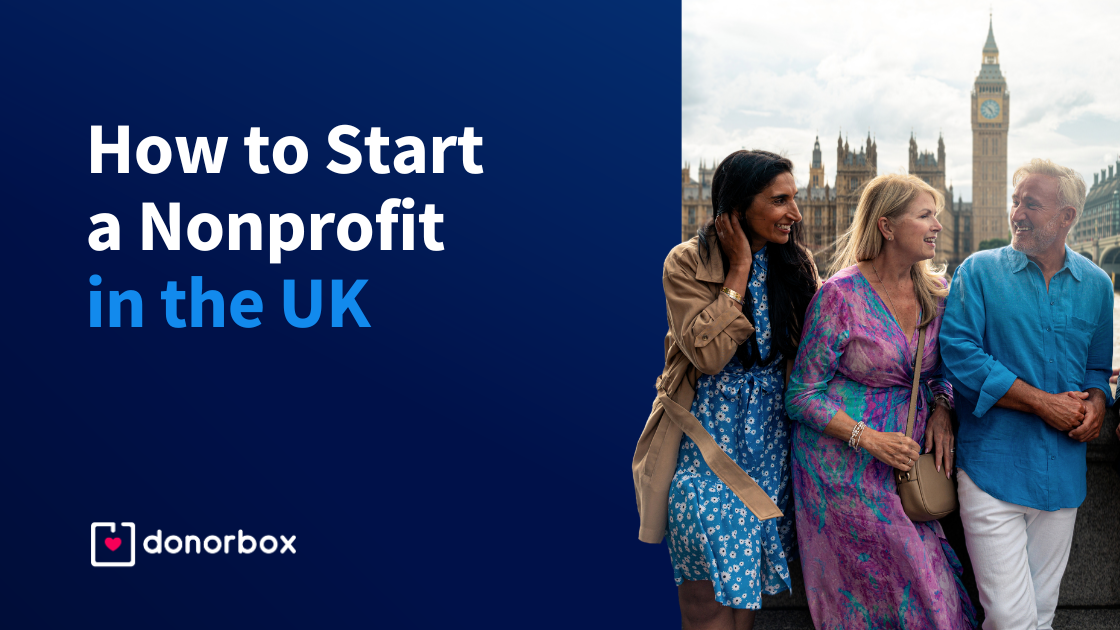Nonprofits hold a critical role in society, whether providing health care options, supporting those in poverty, educating the public about civil issues, or brightening the community with artistic creativity. Setting up a nonprofit organization in the UK is an effective way to make these impacts. Keep reading to explore how to set up a nonprofit organization UK.
If you’re interested in starting a nonprofit in the United Kingdom (UK), you aren’t alone. In 2023, 168,893 new charities were registered, and another 20,000 were formed without registering. In this article, we’ll delve into different options for nonprofits in the UK, legal structures, and requirements and offer a step-by-step guide to get you started.
Setting Up a Nonprofit in the UK

The name nonprofit can be confusing. These organizations can make substantial income, but all funds must be cycled back into the organization to support its missions. Between 2011 and 2023, this workforce has grown by 24% or 180,000 people. While some of this sector has shrunk since the COVID-19 pandemic ended, the growth of this community cannot be ignored.
With this in mind, it’s understandable why so many people ask how they can set up a nonprofit in the UK. In the UK, a nonprofit organization is any non-business organization formed to provide programs, services, or funds to help further cultural, educational, religious, or professional objectives.
Planning Your Nonprofit
While you may be eager to dive into setting up your nonprofit organization, there are a few things to consider before you begin. It’s best to develop a plan for what you hope to accomplish and how. There are a few significant steps you should take in the beginning.
Find your Purpose
The first step to planning your nonprofit is determining your nonprofit’s purpose or mission. According to the Charities Act 2011, a charity’s purpose must fall under one of the following 12 specific headings:
- Poverty prevention or relief
- Education
- Religion
- Health issues
- Citizenship advancement or community development
- Arts, culture, heritage, or science
- Amateur sports
- Human rights, conflict resolution or reconciliation, promotion of religious or racial harmony, equality, and diversity
- Environmental protection or improvement
- Relief of those in need (children, seniors, or those facing ill health, disability, or financial hardships)
- Animal welfare
- Promotion of the efficiency of the armed forces of the Crown or efficiency of the police, fire, rescue, and ambulance services
Charities cannot have commercial or political purposes. Other nonprofit organizations are not held to these stringent standards.
Develop a business plan
In the beginning, your purpose may be vague. After defining your purpose, you must ask yourself a few key questions:
- What issues affect your community?
- How is your program different from other organizations doing the same thing?
- Who is your target donor, and how will you reach them?
Answering these questions should help you create a detailed mission and vision statement for your nonprofit. When writing your mission statement, you must share who you’re helping, why, and how. Your vision statement should help donors visualize what you hope to accomplish with your services and programs.
A mission statement is also the first step to developing a business plan for your new nonprofit. Business plans can help you establish goals, market to donors and beneficiaries, attract trustees, and solicit funds. As part of your business plan, it’s best to run a SWOT analysis to understand your community better and develop a marketing plan to reach out to the public and find new donors.
Find Trustees
Setting up a nonprofit in the UK should never be a one-person job. Forming an effective team in the beginning will provide support and make the process easier. The UK has several rules and regulations for nonprofit trustees, including:
- UK nonprofits must have three to twelve trustees
- Must be at least 16 years old to be a trustee to a charity that is a company or CIO
- Must be 18 to be a trustee for any other nonprofit
- Must be appointed following the organization’s governing document
Disqualifications for trustees include:
- Bankruptcy or individual voluntary arrangement (IVA)
- Having an unspent conviction for certain offenses
- Being on the sex offender registry
Trustees or board members ensure the charity carries out its purpose. They must comply with the UK law and the charity’s governing document. While acting on the charity’s behalf, trustees must manage resources and act in its best interest. Finding the right trustees or board members can be time-consuming and frustrating, so it’s best to start the process early.
When soliciting and choosing board members, it’s important to be clear about your needs and requirements and to find individuals with the necessary skills and personal connections. UK nonprofit laws require two unconflicted trustees, so if you have a couple on the board, there must be at least two additional board members to counteract their vote. Each of your board members must also sign a trustee declaration, declaring that they are willing to serve, understand the charity’s purpose, and have passed any required security checks depending on your beneficiaries. Be sure to print and save these forms as a PDF.
Legal Structure and Registration for Nonprofits in the UK

Now that you have a concrete plan to set up a nonprofit in the UK, and established a team to help, it’s time to develop a legal structure and register your nonprofit. Almost all charities must register with the Charity Commission if their income exceeds £5,000 (CIOs should register even if their income is less than this).
Choose Your Name
Choosing a name can be fun but may take longer than expected. If you’re struggling to find a compelling name that shares your mission, we’ve included a naming checklist to help.
Choose a Structure
Choosing a structure for your nonprofit affects how you will operate in the UK. Some of the questions you’ll want to ask include:
- Who will run it, and will you have a wider membership?
- Do you want to enter into contracts and employ staff?
- Will trustees have personal liability?
Remember, you can change your structure if your trustees decide a new structure is best for the organization.
There are four different nonprofit legal structures you can choose from when you set up a nonprofit in the UK:
Unincorporated Association or Unregistered Charity
- Gross income cannot exceed £5,000
- Nonprofits with charitable objectives that meet the public benefit test but are not registered with a regulator
- Individual trustees are personally responsible for any debts and contractual obligations
- Can’t enter contracts or control investments in its own name
- Two or more trustees must “hold” land on your charity’s behalf
- No charity number or access to registered charity benefits
- Can open a bank account (will need a constitution and details of your trustees)
- Do not pay tax on most types of income used for charitable purposes
- Best for new nonprofits and smaller charities with no employees
Community Interest Company (CIC)
- A limited company with charitable aims
- Must be registered with the Companies House and the Charity Commission if income is over £5,000 (limited by guarantee)
- Can enter contracts and hire staff
- Quicker registration process than the CIO
- Founders can be paid and strategically control the nonprofit (it must be stated in the constitution that the organization can employ the founder)
- Not subject to tax breaks open to other charities
- Fewer funding opportunities
- The registration fee is £27 to register
Charitable incorporated organization (CIO)
- Can be membership organizations or governed by trustees
- Can enter into contracts and have staff
- Must only register with and is regulated by the Charity Commission, not under the Companies House
- Registration process can take up to four to six months
- Access to tax breaks even if you don’t exceed £5,000
- Trustees of CIOs are not personally liable for what the charity does
Trust
- Created to hold and manage assets for the benefit of others
- Must be a charitable purpose and be governed by trustees
- Does not have a wider membership
- Trustees are appointed instead of elected
- Cannot enter into contracts or own property
- Trustees are personally responsible for liabilities
Create a governing document
After choosing a structure, it’s time to create a governing document. Your business plan should have most of the required information, but there are a few more that are necessary, including:
- Charity’s purpose
- Who runs the organization, and how
- How trustees will be appointed
- Rules about trustee’s expenses
- Rules about trustee payments
- How to close the charity
Complete an online registration form
Now, it’s time to complete the online registration form with the Charity Commission. In addition to an introduction to your organization, your application must include the following:
What to include in your application
| About the charity | Copy of Governing document
Are you replacing an existing charity or not?
Charity name and structure
|
| Classification | Areas in which you work
How to deliver your services
Beneficiaries
Location |
| Public benefits | How you do what you do
Benefit it creates
Grant-making and membership fees |
| Property | Do you own or use property
Copy of lease |
| Contact information | Primary contact for the charity:
Role, email, phone number, address
Organization's website |
| Regulators | Any applicable regulators
HMRC Gift Aid number |
| Finance | Accounts
Estimated gross income
Bank account details
Financial year-end date
Sources of income
Tax issues |
| Connections | Links to a trustee or founder or any organization connected with them (employment, goods/services, benefits, links to other nonprofits)
|
| Trustee Details | Upload a safeguard policy
Trustee numbers and details:
Names
Addresses
Emails
Phone numbers
Dates of birth |
| Declaration | Any additional information |
After you submit the form, the organization and each trustee will receive an email with a PDF copy of your application. The Commission’s response can take a few weeks, up to thirty days.
Register with the HMRC
While you wait for the Commission’s response, you can register for Gift Aid. Unregistered charities and Community Amateur Sports Clubs (CASC) can also register and claim Gift Aid. All other CICs cannot claim Gift Aid.
Gift Aid is a unique UK fundraising scheme that benefits nonprofits and donors. Gift Aid is worth £1.3 billion to the charitable sector. Donors who give via Gift Aid can claim an extra 25p for every donation of £1. Larger donors can claim additional tax relief on Gift Aid from their regular tax rate. Registering with the HMRC may also take up to six weeks to process.
Before registering with HM Revenue and Customs (HMRC), you must have:
- Bank account details and financial accounts
- Official details (Including birth dates and National Insurance numbers)
- Registration number if you’ve registered with a regulator
- Charitable purpose
- Governing document
- Government Gateway ID and password
It can take up to six weeks to process your request. You will receive a Gift Aid number (two letters or an X and up to five numbers) when approved. Nonprofits that use Donorbox can collect Gift Aid using our online donor forms.
UK Nonprofit Compliance and Governance
When determining your nonprofit’s structure, there are essential oversight details you must understand. UK nonprofit charities (CIOs) are subject to the control of the High Court’s charity law jurisdiction. The high court is the civil court of unlimited civil jurisdiction in England and Wales. Scotland, Northern Ireland, the Isle of Man, and the Channel Islands fall under a separate jurisdiction.
This court has the power to make decisions about the administration and purpose of your charity. Your governing documents must adopt the law of England and Wales and cannot be subject to any other country’s jurisdiction. UK nonprofit charities must also have most trustees and administration primarily located in England and Wales.
Trusts and unincorporated associations can make changes to governing documents with trustee and member resolutions, while CICs and CIOs must get the Commission’s authority. These changes can include:
- Provisions on selling, leasing, and disposing of charity land
- Charity Mergers
- Trustees can be paid for services and goods that they provide to or on behalf of charity
Nonprofit reporting requirements
UK nonprofits with a gross annual income of £25,000 must have their accounts independently audited unless their charity’s governing document states otherwise. The Companies Act 2006 removed special rules for the audit of accounts of small charitable companies but also required audits of certain charitable companies. All nonprofit charities in England and Wales must send an annual report to the Charity Commission.
Pro Tip: UK nonprofits can use their annual reports to raise funds throughout the year. Check out this article for tips on how best to do this.
Tax Guidelines for UK Nonprofits
Nonprofits registered with HMRC receive several tax benefits. These organizations must be based in the UK and established for charitable purposes. Nonprofits registered with the Charity Commission do not pay tax on most income, including:
- Donations
- Trading profits
- Rental and investment income
- Profits on disposed assets (property and shares)
- When buying property
To be tax-free, all income must be used to achieve the charity’s mission.
CASCs do not pay taxes on money used to promote participation and provide facilities for eligible sports, including:
- Bank Interest
- Gift Aid donations
- Capital Gains
- Trading Profits (less than £50,000 a year)
- Rental income up to £30,000
- Membership fees
- Food and drink sales
Conclusion
UK charities and nonprofits are becoming significant players in the economy, but few understand the impact they can have. This step-by-step guide allows nonprofit founders to develop a purpose, mission, team, and business plan before filing legal documentation. The UK has a simple online process to set up a new nonprofit. Once you’ve finished this process, Donorbox can help you raise funds for your organization with Gift Aid and other funding sources.
Create customized donation pages and forms, sell event tickets, and run peer-to-peer campaigns to collect start-up funds and other donations.
Visit our website to learn more about products available for nonprofits of every size, and sign up to receive weekly tips and fundraising resources.






